- From Faith Current: “The Sacred Ordinary: St. Peter’s Church Hall” - May 1, 2023
- A brief (?) hiatus - April 22, 2023
- Something Happened - March 6, 2023
I saw Yesterday a month ago, one day after it premiered, and liked it. But since I haven’t commented on it until Nancy’s post, clearly the movie didn’t spark much of a reaction in me. I think that’s because Boyle et al. made the simplest version they could possibly make…which, to me at least, deftly avoided all the most interesting parts of the premise.
Because of the people they were, when they happened, and what they accomplished in such a short time, a Beatles-less world would be orders of magnitude different from our own. Something on the order of a world without Christianity, or television. Our conception of fame would be utterly different, and of music; of politics and activism; and of what is High Art and what is Low Art, and who can practice each. We would still look to, of all people, that cornpone Jesus Elvis Presley as the ne plus ultra of popular stardom and cultural upheaval. Only an idiot or a Hollywood executive would seriously suggest, as Nancy sums up with piquancy, “the world would look just like it does today, except that Oasis would never have existed and John Lennon wouldn’t have been murdered.”
This is only the tip of the iceberg. For one thing, Bohemian Rhapsody would’ve been about Englebert Humperdinck. Angry teenagers would form mime troupes. Doughy myope Ed Sheeran would be in some TV writers’ room somewhere. And Grandpa Gerber wouldn’t’ve lost the family fortune buying stock in Brylcreem.
There are two main theories of history, the first and oldest being the so-called “great man” school, which is self-explanatory. The other is called “history from below,” and holds that economics, demographics, and other broad societal and environmental factors—not individuals—are the decisive shapers of human affairs. Yesterday, from belief or perhaps necessity, holds to this second theory. So do modern historians who, for understandable reasons, prefer hard data. A politician’s deadly charm cannot be quantified; the number of pot shards at the bottom of the Mediterranean can. (I also get the sneaking suspicion that historians, not usually super-charismatic themselves, don’t trust charisma, and seek to devalue its role in human affairs But this is a guess, and probably an uncharitable one, so forget I typed it.)
I, being a devotee of the Middle Way, prefer a blend of the two. In this particular case, I would say that it’s impossible to understand J/P/G/R as individuals and The Beatles as a phenomenon without examining the environments which shaped them and gave them their opportunity. The Beatles were truly, madly, deeply English, but emerged in a ruined Europe utterly dominated by American money and popular culture. Their emergence was an assertion of Europe’s reemergence—a cultural equivalent to the economic miracle that happened in Italy and West Germany. And The Beatles’ worldwide popularity was due to their blending of European culture with American characteristics, in a time when Western politics put the highest priority on welding-together against the Communist East.
But I would also say that the specifics— and the scale—of The Beatles’ accomplishments are a function of four specific people, making decisions that others in their place wouldn’t have made, or if they had made them, wouldn’t have been able to pull off. The Beatles’ talents—and thus their power to shape the culture—were simply greater than their contemporaries’… and that made all the difference.
The Beatles were connectors between what came before and what is today. As individuals and as a group, they were formed in the period between 1940 and 1960; they have to be “decoded” in that context—you can’t truly understand The Beatles without knowing about The Goon Show and Austerity Britain, and before that, the mass trauma suffered by Europe from 1914-45, and America’s unique and essential role in ameliorating that suffering. If you don’t know about those things, so much of the story (and the statements of J/P/G/R) seems random, which it wasn’t, or foreordained, which it wasn’t.
But The Beatles were also a decisive break from what had come before. They embraced, and embodied, a whole bunch of new ideas and behaviors, and left a fundamentally different world in their wake. Through talent and luck, they were able to catalyze a bunch of disparate ideas, turning them into stable, durable aspects of our contemporary culture. (Like, for example, the idea of forming a band and becoming stars; or long hair on men; or recreational drug use; or Eastern religions; or or or….) Before them, these ideas were not widely practiced; after them, they are so common as to be clichés.
This ability to catalyze is what is too often lost when discussing the Beatles today. They had an uncanny ability to identify new and interesting ideas, and put them across in a way that their mass audience understood and liked. Every aspect of the Beatles phenomenon, from their gender-bending haircuts to their disrespectful attitude towards the press, then their dismissal of conventional religion and their use of drugs—and oh yeah, the music—were choices made by four specific people: John, Paul, George and Ringo. They could’ve been great musicians, but homely; they could’ve been great musicians and handsome, but shy; they could’ve been great musicians and handsome, and outgoing, but rather stupid; they could’ve been great musicians and handsome, and outgoing and smart, but easily satisfied; they could’ve been great musicians, and handsome, and outgoing and smart, and inquisitive, but not had the knack of transformation. To do what the Beatles did, they had to be talented and handsome and outgoing and smart and inquisitive and relentless and lucky and…you get the picture.
And because these four guys had all these attributes, everything they did reverberated throughout the society around them—because they, those four guys, made it look interesting and fun. They were the faces that launched a thousand ships.
No other cultural movers—not Warhol, not Leary, not Abbie Hoffman, and certainly not their musical contemporaries—offered such a potent mix. Lennon was from the beginning a fascinating talker with an ability to translate the political into the personal. McCartney was movie star handsome, a pure entertainer with a relentless drive to meld high and low forms into something accessible to mass audiences. Harrison, the ironist, the skeptic, became a tireless proponent of Eastern philosophy and meditation. And Starr was the one anybody could relate to (or thought they could).
As a team, with Brian Epstein and George Martin, they were unstoppable; and once they’d made the market, demonstrating the money at stake, the capitalist mechanism did the rest. Once The Beatles happen, something like The Rolling Stones is a commercial inevitability, as is The Grateful Dead, Bob Marley, The Beastie Boys and Nirvana and Radiohead. The whole plot of Yesterday—from wanting to be a musician in the first place, to sold-out Wembley, with issues of artistic integrity along the way—exists in a world the Beatles made, whether there are Beatles songs in it or not. To be honest, I don’t think the makers of Yesterday can imagine a world truly without the Beatles; I’m sure they don’t want to.
If you look at where the world was in 1962, politically, socially and culturally it’s not so very different from thirty years before. Kennedy-style youth politics is a new thing; the birth-control pill is starting to really make an impact; protest is happening (CND) and there are stirrings of a new freedom in art and popular culture. But all of these things are happening within a fairly stable society. The mainstream is holding. If you grew up after World War I, the world before the Beatles is still comprehensible to you, right down to the sense of impending military apocalypse.
The world of 1972, on the other hand, is vastly different—and that’s in large part due to the presence of Sixties-era catalysts who embodied, combined and accelerated those glimmers, turning them into products to consume and ideas to adopt and identities to inhabit. And while J/P/G/R weren’t the only ones engaged in this catalyzing, they were the most powerful. They were at the very least Bob Dylan to the fourth power, and probably something more like Dylan times Warhol times Kerouac times Kennedy.
As a result, the whole rest of the Sixties and Seventies have to be seen in relation to the Beatles. To what degree would the Boomers have seen themselves as a cohort without The Beatles on Ed Sullivan and Sgt Pepper? If they didn’t see themselves as distinct, would “youth culture” turned into the world-creating force it did? Would corporations have been able to target advertising and products towards them; and without that, would our concepts of adolescence and adulthood have remained the same? Forget whether or not you and I would be meditating or listening to the Dalai Lama—we wouldn’t—would we own t-shirts with words on them? Or question our government? Or smoke pot? Or listen to reggae, much less reggaeton? Or know an out gay person? The Beatles were so foundational to the Sixties, and the Sixties have been so foundational to everything that has come since, that it’s impossible to determine where one ends and the other begins. That’s Yesterday‘s central question, and it’s a question too big and too important for a movie like Yesterday to answer.
But answer it we must. The rightward lurch in the US and Britain can be summed up thusly: “we want the world we imagine existed before the Sixties.” In other words, a world without the Beatles. Isn’t that the simplest way to describe what Putin ‘n’ pals seem to want? A white world, where you’re born is where you’ll stay, no freedom for women or minorities, art and music as mere wallpaper, the pursuit of money as the only goal, no questioning the government, the lower orders knowing their place…
But these rights form the corpus of modern life; they are all, I hope, too ingrained for mere politics, no matter how cruelly and brutally applied, to remove them. Trump wants post-Sixties sexual freedom for he, but not for thee. It was the Beatles who opened Britain to the world, and vice-versa, and Boris’ Brexit is a schoolboy-stupid attempt to retain the benefits of that arrangement without its responsibilities. It’s not just that J/P/G/R are more-or-less contemporaneous with NATO, they are its musical equivalent; not for nothing were Beatles records were synonymous with freedom in the old USSR, and not for nothing did Russia celebrate its economic change via a Red Square concert by Paul McCartney. Our world is a profoundly post-Beatles one, from our inability to define adulthood to the dominance of popular culture over all other forms of expression, to our insistence that our leaders be entertainers and vice-versa.
The world the Beatles bequeathed us isn’t a perfect one, far from it; but it’s decidedly better than the alternative, and on this Yesterday and I completely agree. But I’ll go further, on this day when the anti-Trump majority of the U.S. tuned into Robert Mueller’s testimony, hoping it would be our Ed Sullivan moment: If we are to save ourselves from The Stupids, we’re going to have to use the tools left to us by John, Paul, George and Ringo—without the talents and charm of John, Paul, George, and Ringo.
Good luck to us.


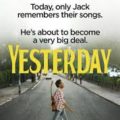
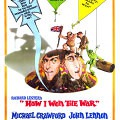
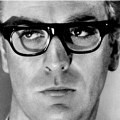
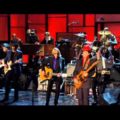
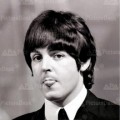
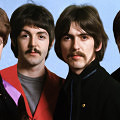

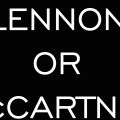
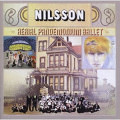

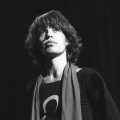
Well-articulated, Michael.
Thank you. I pride myself on my articulation. 🙂
Beautiful Micheal.
I haven’t seen the movie because I wouldn’t be able to buy into the premise. I can’t imagine a world without The Beatles and don’t want to!
To me, The Beatles were blessed with a wonderful, magical gift, of bringing joy and love and peace to all who hear their music.
Their music IS happiness. It touches our souls and makes us feel good. It is a spiritual experience.
This gift defies time, as we are still listening 50 years later. New generations of fans are finding them, and embracing them. This is wondrous.
The times we are living in are very troubling and scary. I have been on edge since Trump was elected. I have found solace in listening to The Beatles. I think the message of their music may be needed now more than ever.
I’m not sure the theme of the movie is “imagine a world without the Beatles” — I think the theme is “Imagine a man who dreams of stardom; of millions of adoring fans, but can never attain it through his talents, but then finally becomes a star thanks to plagiarism. And then he learns that keeping the love of the woman who was always his adoring fan is more important than the shallow thing he thought of as success.
(Bear with me here, obviously I’m not good at writing succinct pitches)
It’s not a Beatles movie. We shouldn’t approach it as a movie about the Beatles. It’s a movie about one man’s ambition, a wrong-headed man who thinks he can only be “successful” if he can fill a stadium with strangers who love his music. It takes elderly Lennon (who I still think should have had cats in the film, not a dog) to set him right; to show him what real success means. And it doesn’t mean hit records.
The Beatles are incidental to this. It could have been a movie about an unsuccessful writer who dreams of writing bestsellers, and then wakes up in a world where Stephen King never existed. But cinema is a visual and audio experience, and tapping away at a laptop isn’t as dramatic and satisfying as a musical fest.
Rather than meeting a 78 year old Ringo who shows him what real success is, he meets Lennon, the man who (in what we consider the … correct … timeline) was murdered by an obsessive “fan.” That’s the gut punch of the film.
Well said, Michael. You’ve put your finger squarely on the issues that “Yesterday” evades.
.
I essentially agree with Sam’s comment that this really isn’t “a Beatles movie.” It’s using the Beatles as a premise, but it isn’t actually willing to deal with them at all. I fear that, for all its insistence that the Beatles’ music is timeless, the film ends up unwittingly presenting music-as-wallpaper. Because if not having the Beatles really made no obvious difference to the world we inhabit, then their music —however lastingly popular — falls into that category.
.
We could have a long discussion about just how much difference the Beatles made beyond and through music, but I think “Yesterday” isn’t interested in that debate. As Sam points out, the movie is after something less interesting and more conventional.
“We could have a long discussion about just how much difference the Beatles made beyond and through music”
Let’s have at it!
I think the movie’s theme can be summed up by a Beatles song title:
All You Need Is Love
…which is an idea that should be examined more closely, I think. 🙂
I just heard on The Beatles Channel that director Danny Boyle, and Himesh Patel will be
on tomorrow night as guest DJ’s, playing their favorite Beatles songs. That should be good.
The cast of “The Big Bang Theory” did that earlier this year and it was very interesting to hear what their favorites were.
If you listen, tell us which ones they liked!
Michael, I think that’s our whole blog! 🙂 (Talking about the difference the Beatles made through and beyond their music, I mean.)
I agree with Nancy and Michael that Beatles music is timeless.
Which is why I was irritated by movie critics who in their Yesterday reviews wondered “but would Beatle songs even be popular nowadays??” As if those outrageously inventive and catchy melodies are somehow quaint but ineffectual artifacts, rather than powerful art that newer generations (who weren’t even alive when Wings broke up!) are still going nuts for. I mean, everyone has stories about their 10 year old nephew or granddaughter who just discovered HELP! or YELLOW SUBMARINE and has it on endless replay.
Remember that those critics are soaked in the cult of the eternal now. You can’t be a movie critic these days without accepting some lamebrained idea of “zeitgeist” as all-powerful. The enduring popularity of the Beatles’ music (and even them as personalities) flies in the face of this idea, so they have to be cut down to the size of what’s popular now.
The idea that some popular art is definitively better than other popular art strikes some as snobbish. But that doesn’t elevate “Wonderwall” to the status of “Strawberry Fields Forever.” Only time and quality can do that.
I’m afraid I agree that the Beatles might very well not be popular if they came out today. But I can believe that while also believing that their music is timeless and objectively better than what IS popular today.
It’s like Shakespeare: his work is timeless because it deals with eternal themes in beautiful language, but it’s not our language. We only accept his stylistics because we know they were appropriate to the era from which they came; if he appeared today he wouldn’t make any sense. And yet every generation rediscovers him and falls in love with his work.
Same with the Beatles. The musical and lyrical language of the ’60s is profoundly different from ours. So while the Beatles undeniably have better melodies than contemporary stars, I’d argue that melody isn’t particularly important in modern music compared to rhythm, production and hooks. You could say that that’s because modern music is lazy and destined to be forgotten, and I’d largely agree. (My more positive spin on it is that modern pop traces its lineage through disco and ’50s rock ‘n’ roll back to African rhythms, and is more about the tradition of dance than the classical tradition of melody. Look at the genre and drug terminology: ecstasy, trance…)
So when I say I doubt the Beatles would make it today it’s just a statement of opinion based on what I hear around me, not a value judgement. And thoroughly agree that we’re all living in the house the Beatles built when it comes to the way we conceive of popular music in the first place (not to mention popular culture in general, not to mention culture in general), which is what makes this premise so crazy to begin with. The film would have made more sense with an ABBA soundtrack.
That’s all reasonable, @Justin.
When you say, “I doubt the Beatles would make it today,” are you saying in our contemporary world — ie, in a world where the Beatles had existed? Then our contemporary Beatboys would be a different group, with a different sound, because all the Beatles-stuff had already been done, and Lennon and McCartney wouldn’t have been content to copy; that’s why they aren’t Oasis. What they’d be into as teenagers would’ve been different, for one thing.
But let’s assume it’s a world where the Beatles hadn’t existed, but our contemporary music somehow arose without it. I am a romantic and tend towards thinking Beatles über Alles, for two reasons:
1) Beatles-type music may not be dance music, but it’s quite similar to contemporary country and alternative and so forth. And it still hits the top of the charts, even as reissues. So even a Beatles that was simply a really really great version of XTC would probably be very popular. They wouldn’t dominate our culture, because nothing does…or maybe they would.
2) The historical Beatles blended a whole bunch of elements into a sound which fans of all those elements enjoyed. I see no reason why they couldn’t do that today. Remember, they’re geniuses — and a big part, maybe the biggest part, of being a genius is working within your time. A contemporary Beatboys would add melody and a ton of other stuff (including blinding charisma) to the contemporary dance music formula.
Were the historical Beatles a product of their time? Yes. Is our time super-diverse and focused on other elements than Beatle-type melody and songwriting? Yes. But the music scene was ununified in 1963, and they unified it. They would do the same today, which is how we’d know they were the Beatles.
I agree with Nancy’s review. And it’s probably asking too much of any movie to imagine a world where the Beatles never existed.
The movie’s magic for me were the scenes where people hear the songs for the first time. “Yesterday” and “The Long & Winding Road,” for example. It sparked in me a re-recognition of the magic of THE SONGS.
When Ed Sheeran proposes the contest, it really highlights this. Ed’s song is fine. He’s talented. But then you hear “The Long & Winding Road” and it’s game over.
A little poem about the Fabulous Four by a German Fan:
THE BEATLES
This wonderful English Group
Was better than all of YouTube.
They created a brand-new sound,
A modern guitar style was found.
John,Paul,George and Ringo
Started their glorious Show.
Four nice boys from Liverpool,
Always smart and very cool;
Became heroes in Great Britain
With titles,they’ve brilliant written.
From “Please,please me” to “Let it be”
Music in perfect harmony.
They dominated the global Charts,
Till today they take to our hearts.
The songs are heard around the earth
By old Hippies just as young Nerds.
Their music will be forever,
The Fab Four we’ll forget never.
Rainer Kirmse , Altenburg / Thuringia | Germany
Justin, I think you’d like The Lumineers. A modern band continuing the tradition of melody:
https://www.youtube.com/watch?v=Kok4-aVdyT4
I’m really enjoying this discussion! I’d like to say a quick word about the ending (SPOILERS AHEAD).
.
I had very mixed feelings about the film’s ending being driven by the surprise appearance of John Lennon. It felt both implausible in a whole new way from the rest of the movie (I’ll explain what I mean by that in a minute) and as if the film’s makers were asking “How can we Hollywood up this movie even more?” It’s like EVERYTHING has to end happily—Jack discovers true love, the yellow-sub wielding folks you think are going to expose Jack turn out to be superfans, apparently Jack can magically get out of his contract with no consequences,etc.
.
Which in one way, fair enough. This film takes itself and everything else so lightly that I can’t really be mad at it. Subjecting it to too much examination feels like the proverbial breaking a butterfly on a wheel.
.
But the Lennon thing adds a whole new dimension of “wait, what?” to the movie. Did the Beatles exist in this reality, or didn’t they? If they never existed in this reality at all, how the heck does Jack remember them? Is this a whole parallel universe situation? The John we meet seems to be a painter. Where are Paul, George, and Ringo in this version? And what will happen with them all once Jack is going around crediting their songs to them?
.
Mostly my response to these questions is “oh, whatever” because this movie is just trying to be fun and has zero interest in believable world-building. But I can’t shake the feeling that the Lennon ending is unearned and part of a goody-goody-gumdrops resolution I’m not sure the real Lennon would have liked.
…and also the film’s Lennon says something that makes you think that he married Yoko, as well. Even though he apparently is a painter living in a small tumbledown house on the seashore.
I swear, the ability of people (but especially Boomers) to project onto John and Yoko is inexhaustible. It’s so clear that a million middle class hippies circa 1969 were looking at John and Yoko and saying, “They’re just like us!” When the whole POINT of those two people is how much they didn’t want to be like normal people, and the huge lengths they went to, to avoid that fate.
That they did it at 21 is excusable; that they’re still doing it at 71 is…peculiar. These people do/did exist, and haven’t been, or weren’t, shy about who they were.
A certain type of fan simply cannot see John Lennon, except as an expression of his (usually it’s a him) own self. I think that must’ve been quite difficult to encounter; it’s probably a big part of the toxicity of fame. I think it’s a mark of highest respect towards an artist to attempt to perceive them as a person, and not diminish their whole self and career to fan-service.
Good point about the Yoko reference. Plus the ending is so aggressively quaint (that “tumbledown shack” looks like it was styled by Crate and Barrel, for example). God knows I wish Lennon had lived to a ripe and happy old age, but in this movie he feels like a deus ex machina that undermines what the film seems to want to say about the Beatles’ music. Like, it makes the world a better and happier place, but Lennon is happier without it (maybe without ever having made it? I still don’t get that at all).
.
When a stone McCartney fan like me feels an ending is too saccharine, I think your film has a problem.
I saw this comment over at the Historian/Beatles blog and (in the interest of cross-pollination) thought I’d share it:
Anyway [May Pang] was hanging out at the convention and really not talking to a lot of people, so I sat down with her and we had a pretty long conversation about her book and about a lot of other things, including the fact that she and John were still seeing each other right up to his death. When I asked what about Yoko, she said that Yoko had a relationship with Sam Havadtoy, who was in his late twenties, so she didn’t mind John having someone to keep him occupied, sort of the same way May did when Yoko was having the affair with David Spinoza and sent John off the first time. She was also rather bitter about the whole characterization of the “Lost Weekend,” pointing out that the well-publicized incidents were actually not the norm for that time and that John had a pretty creative period then, as well as reconnecting with Julian and Paul, something she says Yoko cut off when he came back to her.
May was also rather bitter about the Sam Havadtoy thing, especially since he moved in and was wearing John’s clothes and basically acting like Yoko’s husband, which May also said may have been the truth! They were together for 20 years afterwards, but no one was “allowed” to talk about him and when they eventually broke up he got a very large settlement.
https://beatlebioreview.wordpress.com/2019/07/16/controversial-cornerstones-book-review-martin-kings-men-masculinity-and-the-beatles/
Thanks for posting this, Sam — what a great blog! Good to see you and former HD contributor Karen Hooper posting comments there, and the general tenor of the conversation. Whenever substantive conversations are occurring on the internet, I get a little more hope back for humanity in general.
.
May Pang and Julian Lennon really get discounted by the “John and Yoko” mythology. I hope we see more public acknowledgement of their experiences — it was good to see Julian get to do some speaking in the new “Imagine” documentary.
[…] commenter @Hologram Sam provided this comment in one of our earlier threads. I commented, but as is usual these days had enough to say that […]
Can’t seem to reply to comments at the moment so I’ll just comment at the bottom. Thanks for the song @Sam, it reminds me of the Beatles in that instead of having a Big Chorus it’s got a cool bridge instead. Fun. In return I give you a bit of my beloved Janelle Monae: https://www.youtube.com/watch?v=cNWh_gSgtNU
@Michael, I was talking about cutting the Beatles songs from the ’60s and pasting them into the present day basically unchanged (naturally, the earlier material’s audio has been scrubbed up and the flubs have been Pro Tooled out. Can’t let the stuff sound TOO human). To me, this would be roughly like releasing On the Road today: people would recognise the greatness but would be unable to shake the feeling that the author’s rhythms and stylistics didn’t quite fit. Kerouac in the ’50s is a genius; Kerouac today’s simply a talented retro act.
Your second point seems to suggest a world where the Beatles arise today, write the same melodies – or at least material with a similar aesthetic – and arrange them with an eye towards today’s trends. So if the Beatles we know combined rock ‘n’ roll, music hall and ’50s balladry and transcended them, these Beatles would fuse electropop, alternative and contemporary balladry and transcend those.
If we consider that ’50s rock ‘n’ roll wasn’t any more melodic than rap or EDM, give or take a Buddy Holly or two, this idea starts sounding pretty plausible. A lot of the raw materials the Beatles loved haven’t aged that well, but their synthesis of those elements has. I like the idea of a modern equivalent coming along and saying ‘Hip hop, techno and dance are all very well – but now let’s try them with melody.’ Why not? If you can make classical Indian music into Western pop you can do just about anything.
Then I remember that this beloved Janelle Monae of mine – who actually does fuse R&B, rap, funk, soul, rock, psychedelia, synthpop, trap, musical theatre and classical, all while putting on the best live show going – is outsold many times over by Ed Sheeran. Oh well. Gotta stay positive, eh?
Great comment. Well, @Justin, remember that genius often sprouts in neglected areas; my guess is that geniuses are attracted to the freedom of that. And also genius is more obvious in neglected areas because it creates something where there was nothing, as opposed to being simply a matter of scale.
You can see that after Pepper, the Beatles were creating masterpieces but were not alone at the pinnacle, commercially or in public perception, as they’d been; if they had toured again, would they have been outdrawn by Led Zeppelin or Queen? I think that is one thing that stayed Lennon’s hand in the mid-70s.